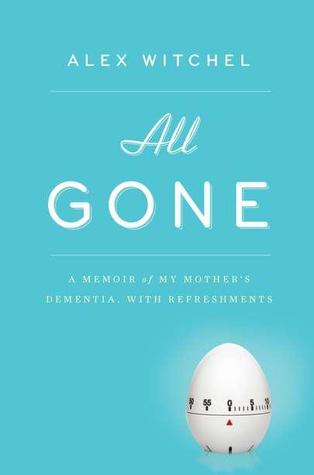Books |
All Gone: A Memoir of My Mother’s Dementia. With Refreshments
Alex Witchel
By
Published: Oct 25, 2012
Category:
Memoir
Salmon swim upstream, and so do the children of unhappily married Jewish women.
Alex Witchel had the full cast of characters. A remote, disapproving father who once punched her in the face and then insisted that she apologize. A hard-to-please mother who wound her children up tight, kissing them as they went off to the first day of school and offering this wish: "May you be brilliant."
I know this story. As you may. It’s a suburban story of middle-class Jews with modest houses and big dreams. This one comes with recipes: the food of our people. Meat loaf, potato pancakes, chicken with prunes, frankfurter goulash. If you are Jewish and of a certain age, this world is as familiar to you as a Philip Roth story set in Newark; it’s what you can’t get away from, no matter how great your success in the city.
Not that Alex tried. She graduated Phi Bete and triumphed in New York, writing charming articles about food for The New York Times and marrying its then-drama critic, Frank Rich. Emotionally? She never really left her mother.
But her mother left her.
Barbara Witchel, force of nature, director of the Iona College graduate campus, a mother of three who got her PhD after she had kids, who gardened, cooked, ran a fastidious house, drove a convertible — in her early 70s, a stroke sets her on the road to dementia.
“It’s called ambiguous loss,” a social worker tells Alex. "Gone, but not gone. She is your mother, but not the mother you knew. If she had died, it would be easier to grieve the loss. It’s hard to do that when she’s sitting in front of you.”
“All Gone” is a record of that disappearance. So are a lot of books. Memoirs like this are how the left-behinds keep the people they lose close, as present as their parents were when they first imprinted on them. These books are eulogies, delivered in advance. Are they maudlin exercises? Mostly.
I single out Alex Witchel’s book for praise because it’s more than a story of a triumphant personality laid low. It’s other books as well. A mother-daughter love story. An account of a young woman finally figuring out that her boyfriend of a decade is, in his way, as abusive as her father, and moving on to meet and marry a mensch. And, not incidentally, how cooking — even with canned vegetables — binds generation to generation.
“All Gone" is also a writer’s book. That is, it’s an elegant, smart literary construction that amuses and breaks your heart by turns. It delivers killer sentences – like her mother, to Alex: “You can’t make me happier. I’m losing myself. What’s to be happy about?” — at just the right time. Or passages like this:
Would I prefer to have lost my mother completely, without warning? I used to think the answer was no. Still, as hard as that would have been on me, maybe it would have been better for her. To die as herself. Because the worst part was watching her know that she wasn’t in there anymore — watching her face as she heard herself speak and saw how other people reacted. No awards for bravery for keeping going while realizing how diminished you are, watching flashes of yourself crackle then disappear, like lightning.
Sad? Yes, but it’s a pleasure to read a book this sad. [To buy the book from Amazon, click here. For the Kindle edition, click here.]
Oh, and the book has a hero. As her mother loses her mind, so does Alex; she’s forgetful, distracted, depressed. In a word: absentee. I can think of a dozen husbands, feeling neglected, who would look for relief elsewhere. Frank Rich, at a critical moment, takes Alex’s hand and says, ”I’m waiting for you to return to me.” Could you write a more piercing line? I couldn’t.
Dementia and its cousin, Alzheimer’s, are showing up in the lives of more and more of our parents. For the adult children who are whipsawed by the experience of losing a parent in plain sight, Witchel’s is a short, powerful guide to the path ahead. It’s also that tough thing to pull off — a beautifully calibrated piece of writing that is not at all calibrated in its emotional honesty. If she knew what her daughter had made here, Barbara Witchel would be very proud.


